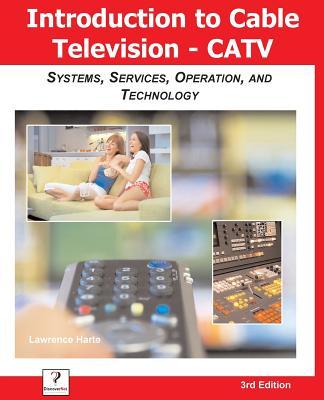Introduction to Cable Television (CATV) 3rd edition explains the functions of cable television systems, technologies they use, advanced advertising, tCommerce, and how it is combining with Internet TV.
Cable television (CATV) is a television distribution system that uses a network of cables to deliver multiple video, data, and audio channels. This book provides an overview of cable television system technology including cable modems, digital television, high definition television (HDTV), along with how cable systems are evolving to offer advanced services such as ultra broadband and video on demand (VOD).
Described are the basic parts of cable television systems including headends, distribution systems, set top boxes, and cable modems. Analog and digital video technology fundamentals are provided including the different types of analog video (NTSC, PAL, and SECAM) and the key types of digital video compression (MPEG-2, MPEG-4 AVC and HEVC).
You will discover why and how cable system operators are converting networks from analog to digital to give more channel capacity and to provide for broadband Internet (cable modem) services and advanced advertising and Internet TV services. Described are the fundamentals of the data over cable service interface specifications (DOCSIS) and what each revision of DOCSIS provides to cable system operators.
Explained are the different types of subscription services and value added pay per view (PPV) services including near video on demand (NVOD), subscription video on demand (SVOD), and transactional video on demand (TVOD). You will learn how cable systems can upgraded to offer telephone services and why cable operators are transitioning from proprietary telephone systems to industry standard voice over Internet protocol (VOIP) systems.
MMDS and LMDS wireless cable technology is described along with how cable operators can efficiently use these wireless systems to extend the range of their cable systems. The future of cable television is discussed including advances in interactive television and addressable advertising.
Learn how cable TV broadcast systems are is transforming into packet data IPTV systems. Discover how CATV systems work with home networks and how digital living network alliance (DLNA) automatically finds and connects devices..
Discover how cable TV systems can offer tCommerce capabilities using smart TV apps and how broadcast and broadband TV services are combining using HbbTV.
This Book Covers:
- Components and Operation of CATV Systems
- MPEG Compression & Digital Formats
- Cable Modems using DOCSIS
- Cable Telephony
- MMDS and LMDS wireless cable
- How CATV is evolving into IPTV
- Advanced Advertising Options
- CATV and Home Networks with DLNA
- tCommerce Capabilities
- How Broadcast and Internet TV is Combining using HbbTV
